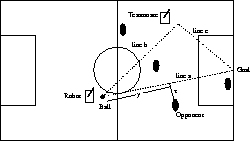


Next: The Goalkeeper
Up: Multiagent Behaviors
Previous: PositionsFormations, and Active
One of CMUnited-97's main features is the robots' ability to
collaborate by passing the ball. When in active mode, the robots use
an evaluation function that takes into account teammate and opponent
positions to determine whether to pass the ball or whether to
shoot. In particular, as part of the formation definition, each
position has a set of positions to which it considers passing. For
example, a defender might consider passing to any forward or
midfielder, while a forward would consider passing to other forwards,
but not backwards to a midfielder or defender.
For each such position that is occupied by a teammate, the robot
evaluates the pass to that position as well as evaluating its own
shot. To evaluate each possible pass, the robot computes the
obstruction-free-index of the two line segments that the ball must
traverse if the receiver is to shoot the ball (lines b and c in
Figure 7). In the case of a shot, only one line segment must
be considered (line a). The value of each possible pass or shot
is the product of the relevant obstruction-free-indices. Robots can be
biased towards passing or shooting by further multiplying the values
by a factor determined by the relative proximities of the active robot
and the potential receivers to the goal. The robot chooses the pass
or shot with the maximum value. The obstruction-free-index of line
segment l is computed by the following algorithm (variable names
correspond to those in Figure 7):
- obstruction-free-index = 1.
- For each opponent O:
- Compute the distance x from O to l and the
distance y along l to l's origin, i.e. the end at which the
ball will be kicked by the robot (See Figure 7).
- Define constants min-dist and max-denominator. Opponents
farther than min-dist from l are not considered. When discounting
obstruction-free-index in the next step, the y distance is never considered to
be larger than max-denominator. For example, in Figure 7,
the opponent near the goal would be evaluated with y =
max-denominator, rather than its actual distance from the ball.
The reasoning is that beyond distance max-denominator, the opponent
has enough time to block the ball: the extra distance is no longer
useful.
- if x < min-dist and x < y,
obstruction-free-index *=  max-demoninator,
max-demoninator,  .
.
- return obstruction-free-index.

Figure 7: Pass Evaluation--To evaluate a pass to a teammate, the
robot considers how open the paths are from the ball to the teammate
(line b) and from the teammate to the goal (line c). When evaluating
shots, it considers the line from the ball to the goal (line a). For
each opponent and each line segment, it computes the opponent's
distance to the segment (x) and along the segment to the origin. The
smaller x is and the larger y is, the easier it would be for the
opponent to intercept the ball. Note that some opponents would cause
discounts in the values of passes along more than one segment.
Thus the obstruction-free-index reflects how easily an opponent could
intercept the pass or the subsequent shot. The closer the opponent is
to the line and the farther it is from the ball, the better chance it
has of intercepting the ball.



Next: The Goalkeeper
Up: Multiagent Behaviors
Previous: PositionsFormations, and Active
Peter Stone
Tue Sep 30 19:12:38 EDT 1997
 max-demoninator,
max-demoninator,  .
.
